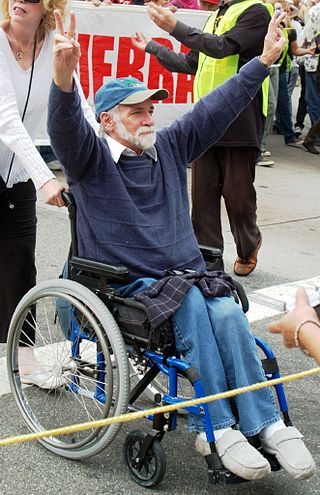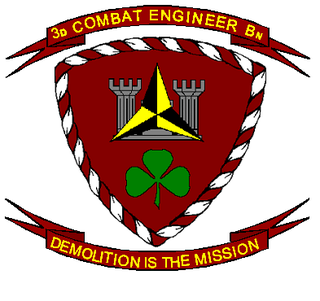
Tim O'Brien is an American novelist who served as a soldier in the Vietnam War. Much of his writing is about wartime Vietnam, and his work later in life often explores the postwar lives of its veterans.

Ronald Lawrence Kovic is an American anti-war activist, writer, and United States Marine Corps sergeant who was wounded and paralyzed in the Vietnam War. His 1976 memoir Born on the Fourth of July was made into the film of the same name which starred actor Tom Cruise as Kovic, and was co-written by Kovic and directed by Oliver Stone.

Colonel David Haskell Hackworth was a United States Army officer and journalist, who was decorated in both the Korean War and Vietnam War. Hackworth is known for his role in the formation and command of Tiger Force, a military unit from the 101st Airborne Division that used guerrilla warfare tactics against Viet Cong in South Vietnam.

The United States Army Rangers are U.S. Army personnel who have served in any unit which has held the official designation of "Ranger". The term is commonly used to include graduates of the Ranger School, even if they have never served in a "Ranger" unit; the vast majority of Ranger school graduates never serve in Ranger units and are considered "Ranger qualified".

The Things They Carried (1990) is a collection of linked short stories by American novelist Tim O'Brien, about a platoon of American soldiers fighting on the ground in the Vietnam War. His third book about the war, it is based upon his experiences as a soldier in the 23rd Infantry Division.

The Battle of Ia Drang was the first major battle between the United States Army and the People's Army of Vietnam (PAVN), as part of the Pleiku Campaign conducted early in the Vietnam War, at the eastern foot of the Chu Pong Massif in the central highlands of Vietnam, in 1965. It is notable for being the first large scale helicopter air assault and also the first use of Boeing B-52 Stratofortress strategic bombers in a tactical support role. Ia Drang set the blueprint for the Vietnam War with the Americans relying on air mobility, artillery fire and close air support, while the PAVN neutralized that firepower by quickly engaging American forces at very close range.

Dale Adam Dye Jr. is an American actor, technical advisor, radio personality and writer. A decorated Marine veteran of the Vietnam War, Dye is the founder and head of Warriors, Inc., a technical advisory company specializing in portraying realistic military action in Hollywood films. Dye has also offered his expertise to television, such as the HBO miniseries Band of Brothers and The Pacific, and video games, including the Medal of Honor series.

The 3rd Battalion 7th Marine Regiment (3/7) is an infantry battalion of the United States Marine Corps. They are based at the Marine Corps Air Ground Combat Center Twentynine Palms and consist of approximately 800 Marines. The battalion falls under the command of the 7th Marine Regiment and the 1st Marine Division. The battalion has seen combat in World War II, the Korean War, the Vietnam War, the Gulf War and was a part of the main effort during the initial invasion of Iraq in 2003. During the Global War on Terror, the battalion saw eleven sequential combat deployments; five in support of Operation Iraqi Freedom, three in support of Operation Enduring Freedom, and three in support Operation Inherent Resolve. The unit has a long, decorated history with countless achievements. Its members were described as "true professionals" by embedded reporters during the 2003 invasion of Iraq.

Dell Publishing Company, Inc. is an American publisher of books, magazines and comic books, that was founded in 1921 by George T. Delacorte Jr. with $10,000, two employees and one magazine title, I Confess, and soon began turning out dozens of pulp magazines, which included penny-a-word detective stories, articles about films, and romance books.

Walter Dean Myers was an American writer of children's books best known for young adult literature. He was born in Martinsburg, West Virginia, but was raised in Harlem. A tough childhood led him to writing and his school teachers would encourage him in this habit as a way to express himself. He wrote more than one hundred books including picture books and nonfiction. He won the Coretta Scott King Award for African-American authors five times. His 1988 novel Fallen Angels is one of the books most frequently challenged in the U.S. because of its adult language and its realistic depiction of the Vietnam War.

The 7th Battalion, Royal Australian Regiment is a regular infantry battalion of the Australian Army. It was originally raised in 1965 as part of Australia's commitment to the Vietnam War and it eventually served two tours in Vietnam in 1967 and 1971. In 1973, following Australia's withdrawal from the conflict, the battalion was amalgamated with the 5th Battalion, Royal Australian Regiment to form the 5th/7th Battalion, Royal Australian Regiment.

Operation Buffalo was an operation of the Vietnam War that took place in the southern half of the Demilitarized Zone, around Con Thien.

The Eye of the Heron is a 1978 science fiction novel by American author Ursula K. Le Guin which was first published in the science fiction anthology Millennial Women.
The 46th Infantry Regiment is a unit in the United States Army that served in World War II and Vietnam. The 1st Battalion, 46th Infantry Regiment currently conducts Infantry One Station Unit Training under the 197th Infantry Brigade.

3rd Combat Engineer Battalion was a combat engineer battalion of the United States Marine Corps, most recently activated from 7 October 2007 to 5 August 2014. 3rd CEB is having a reunion in Neihart, Montana May 19-22 2023 being hosted by Warrior Reunion Foundation.

Operation Hickory was a search and destroy operation conducted by the 3rd Marine Division in the area around Con Thien, Quảng Trị Province known as Leatherneck Square from 18 to 28 May 1967. Operation Hickory was the first authorized incursion into the Vietnamese Demilitarized Zone (DMZ).

The 173rd Airborne Brigade is an airborne infantry brigade combat team (IBCT) of the United States Army based in Vicenza, Italy. It is the United States European Command's conventional airborne strategic response force for Europe.
The 2nd Battalion, 26th Marines (2/26) is an inactive infantry battalion of the United States Marine Corps. They were part of the 26th Marine Regiment and 5th Marine Division and fought during the Battle of Iwo Jima in World War II. They were activated again for the Vietnam War but were deactivated after the war and remain inactive today.

The Battle of the Slopes was the site of an engagement between elements of the 173rd Airborne Brigade (Separate), nicknamed "Westmoreland's Fire Brigade" and People's Army of Vietnam (PAVN) units, as part of Operation Greeley.

The Battle of the Mỹ Chánh Line took place from 5 May to 26 June 1972 during the People’s Army of Vietnam (PAVN)'s Easter Offensive of the Vietnam war. South Vietnamese forces, principally the Marine Division, with extensive fire and logistics support from United States forces, succeeded in stopping the PAVN advance northwest of Huế and launched a series of spoiling attacks against PAVN units. The successful defense allowed South Vietnamese forces to build up strength and then establish jumping off positions for their counteroffensive to recapture Quảng Trị Province.

















